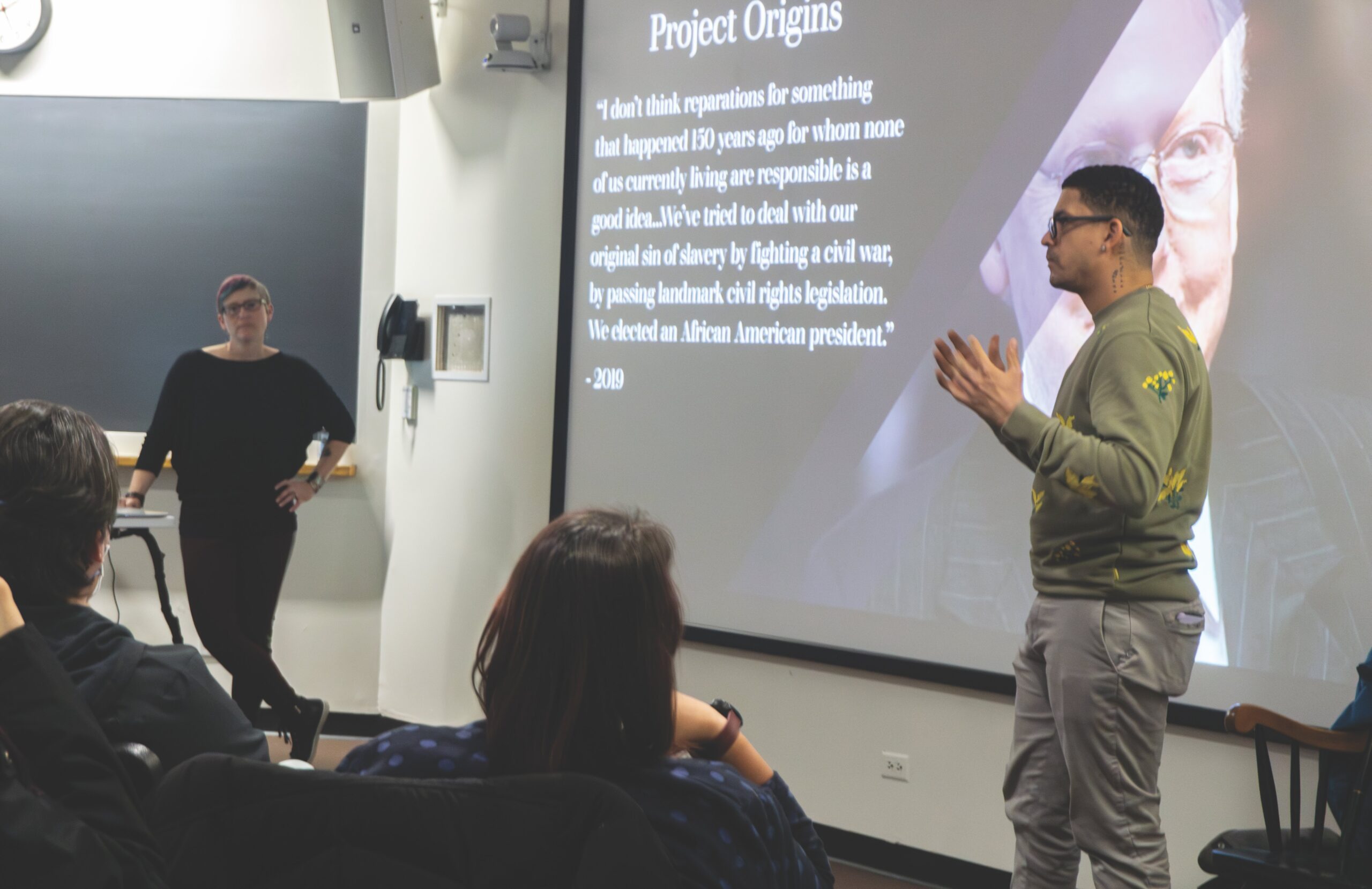Philosophers unpack conversations on race
March 1, 2024
 Joy Wang
Joy WangOn Wednesday, Leland Harper, professor of philosophy at Siena Heights University, and Jennifer Kling, professor of philosophy at the University of Colorado Colorado Springs, discussed the impact of word choice in discourse on race, which they write about in their new book, “Racist, Not Racist, Antiracist: Language and the Dynamic Disaster of American Racism.”
Harper and Kling’s book builds upon Robin DiAngelo’s “White Fragility” and explores ways to expand our racial vocabulary.
The talk opened with an example of a six-year-old girl wearing the ceremonial garb of an unspecified indigenous tribe as a Halloween costume purchased by her parents. Harper and Kling posed the question: Is the six-year-old girl racist?
“This is something that we all probably either have done or can easily imagine,” Harper said. “Think back and maybe you’ll learn that some of your costumes are offensive.”
Harper and Kling agreed that most people would not jump to calling the girl racist. However, they noted there are also likely some people who would call the girl racist, but there would likely be remaining discomfort about the situation.
“It looks like at first glance, there’s reasonable disagreement about how we want to think about, and therefore how we want to categorize, that situation,” Harper said.
This discussion led into Harper and Kling’s main issue with the current discourse on race: the polarized binary of the idolized “not racist” and the villainized “racist.”
“Notice that the only other two options we have to evaluate either put her wholly in the clear—not racist, or racist, [which connotes] evil, bad intention, malicious, worst person ever,” Kling said. “Those are pretty extreme categories.”
To Harper and Kling, the main issue underlying this dilemma is the difficulty in creating a comprehensive definition of racism.
“A classic philosopher move … is we just need to get a really good definition. If I can clarify what I mean by racism, then I will know how to sort things into one of these two boxes,” Kling said. “[But] no matter how good of a definition, because racism is a social and political phenomenon, you are always going to have cases that nibble at the edges, that fit some parts of the definition but not others.”
Moreover, Kling and Harper pointed out that the two extreme categories are limiting and often stifle conversations about race.
“If I say, ‘Hey, that was super racist,’ [the other side] is going to be really defensive,” Kling said.
Harper and Kling argue that this defensive tendency is a problem because, as DiAngelo explains in “White Fragility,” defensiveness prevents conversations about race and reinforces the racial hierarchy. Kling raised a personal experience to illustrate this phenomenon.
“I have students read from Michelle Alexander’s ‘The New Jim Crow,’ where she points out that the criminal justice system perpetuates systematic institutional racism,” Kling said. “[After] I say the criminal justice system is racist, a student raises their hand and says my uncle is a prison guard and he is a good man. I respond that I believe her. But, shooting back [at] me, she says, ‘You just said he was racist.’”
Kling and Harper’s proposed solution seeks to overcome the problems caused by defensive reactions to being called racist. They encourage a broader spectrum of vocabulary to identify racialized experiences that discourages alienation of the other side of the conversation. One term they propose to include in our discourse is “racial insensitivity.”
“[Instead of] immediate character assassination, [insensitivity] is linked to knowledge rather than character. It is a function of how much information you have,” Kling said.
For Harper and Kling, linking racist actions to a person’s knowledge rather than their character increases the likelihood of an open conversation and change.
“If you hear racist, we immediately think character things: I’m a bad person. That’s a lot harder to come back from.… How do you go about improving that?” Harper said. “If I tell you you don’t know something—how do we fix that? Read a book, listen to a podcast, watch a documentary … pretty easy fix.”
Philosophy Student Representative Edmundo Ortiz ’23, who helped publicize the talk for students on campus, welcomed the openness that Harper and Kling suggested.
“I appreciated their willingness to engage honestly on the topic without judgment to the person who is asking the question,” Ortiz said.

Comments
Before submitting a comment, please review our comment policy. Some key points from the policy: